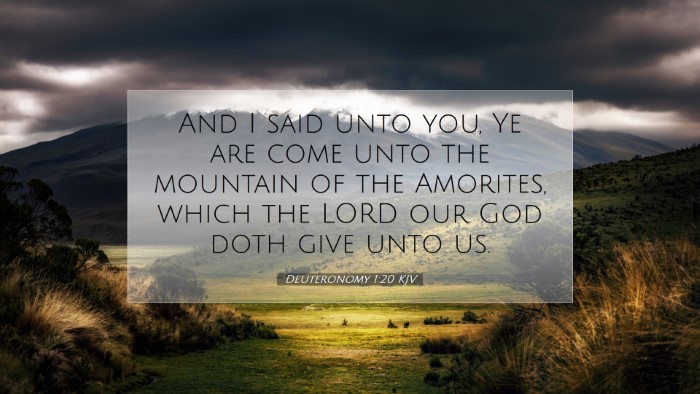Commentary on Deuteronomy 1:20
Verse: "And I said unto you, Ye are come unto the mountain of the Amorites, which the LORD our God doth give unto us."
Introduction
Deuteronomy, a book that means "second law," encapsulates Moses' reflections and exhortations to the Israelites as they stand on the verge of entering the Promised Land. In this specific verse, Moses recalls the pivotal moment of their journey to the mountain of the Amorites, emphasizing God’s promise and the responsibilities that accompany the covenant.
Contextual Overview
This verse serves as a prelude to Israel's conquest of Canaan. In reviewing their passage, Moses aims not only to remind the people of where they have been but also to inspire them with the knowledge of where they are headed under God’s guidance.
Historical Context
- Journey from Egypt: The Israelites had recently been delivered from Egyptian bondage and were traversing the wilderness towards the land promised to their ancestors.
- Conquest Preparedness: As they approach the Amorite mountain, a significant geographical and symbolic marker, they are called to prepare themselves for the impending conflict and the fulfillment of God's promise.
The Geographical Significance
The “mountain of the Amorites” was not merely a physical location but represented a place of challenge and opportunity. Israel must confront the Amorites, known for their wickedness, as part of the divine plan to establish a holy nation.
Theological Insights
God's Sovereignty
Both Matthew Henry and Albert Barnes emphasize God's sovereignty as a central theme in this passage. The statement about the land being given by “the LORD our God” underscores that it is God who orchestrates history for His purposes.
Faith and Obedience
Moses addresses the people’s faith in God’s promise. Their ability to inherit the land is contingent upon obedience to His commands. This is further noted in Adam Clarke’s commentary, where he identifies the necessity for Israel to act in faith based upon God’s assurance of victory.
Divine Promises and Responsibilities
This verse embodies a paradox of divine promise and human responsibility. The Amorite mountain symbolizes not just the inheritance but also the conflicts that will arise, requiring the Israelites to trust and rely on God amidst challenges.
Applications for Today
The Call to Action
For pastors and theologians, this verse acts as a clarion call for Christians today to step forward in faith into the territories God has promised, despite daunting challenges. The mountain is an invitation to trust in divine provision amidst trials.
Living in the Assurance of God’s Promises
This passage encourages believers to remember the faithfulness of God in their lives. As modern-day disciples, recognizing God’s continual guidance in our lives remains crucial in empowering our spiritual journeys.
Preparing for Conquests
- Spiritual Warfare: Just as Israel had to confront physical enemies, so too are Christians called to engage in spiritual battles against sin and darkness.
- Building Faith Communities: This reminds congregations to unite in faith, sharing resources, and praying together to tackle challenges as a community.
Conclusion
Moses’ exhortation about the mountain of the Amorites illuminates a timeless truth about God’s call to inherit His promises. The experiences of the Israelites resonate today, urging believers to step into their destinies with confidence in God’s unfailing commitment. Deuteronomy 1:20 serves as a reminder of God's sovereignty, the need for obedience, and the proactive stance required in pursuing the path laid before His people.


